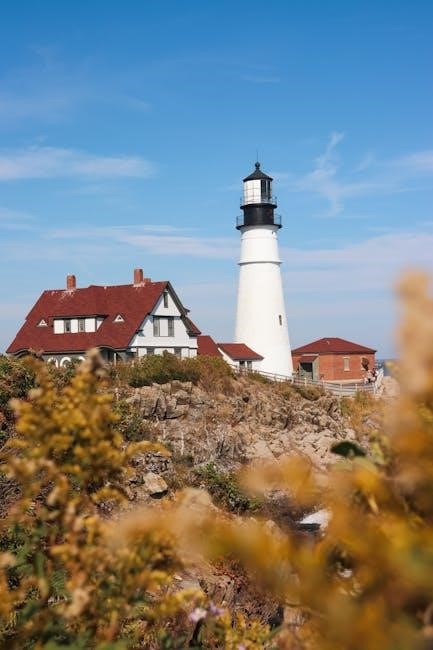Becoming a Registered Maine Guide is a prestigious achievement, requiring extensive outdoor skills, knowledge, and a deep connection to Maine’s natural heritage. This role combines tradition, expertise, and passion for guiding others in Maine’s wilderness, fostering memorable experiences while ensuring safety and environmental respect. It’s a challenging yet rewarding path for those who embody adventure, leadership, and a love for the outdoors.
1.1 Overview of the Maine Guide Profession
The Maine Guide profession is a distinguished role that combines outdoor expertise, leadership, and a deep connection to Maine’s natural landscapes. Registered Maine Guides are certified professionals who lead activities such as hiking, hunting, fishing, and boating, ensuring safe and enjoyable experiences for clients. This profession requires a unique blend of skills, including knowledge of wildlife, navigation, and environmental stewardship. Guides must also possess strong communication and problem-solving abilities to manage diverse groups and situations. The role is rooted in tradition, with many guides drawing on generations of local knowledge. It is both a career and a passion, appealing to those who thrive in the outdoors and are committed to sharing Maine’s wilderness with others.
1.2 Importance of Becoming a Registered Maine Guide
Becoming a Registered Maine Guide is a mark of excellence and credibility, demonstrating a high level of skill and knowledge in outdoor leadership. This certification is not only a source of pride but also a legal requirement for guiding activities in Maine. It ensures that guides meet rigorous standards, providing clients with confidence in their expertise and safety. The certification process involves passing challenging exams, which verifies a guide’s ability to navigate, communicate, and manage wilderness situations effectively. Additionally, it opens doors to professional opportunities and networks, enhancing career prospects in Maine’s outdoor industry. Achieving this status reflects a deep commitment to preserving Maine’s natural heritage while sharing it with others in a responsible and inspiring way.

Meeting the Basic Requirements
To become a Registered Maine Guide, you must meet specific criteria, including age, residency, and passing a background check. These steps ensure eligibility and preparedness for the exams.
2.1 Age and Residency Requirements
To qualify as a Registered Maine Guide, applicants must meet specific age and residency criteria. You must be at least 18 years old to apply. Additionally, you need to prove Maine residency, typically demonstrated by living in the state for a certain period. These requirements ensure that guides have a strong connection to Maine’s landscape and ecosystems. Residency is often verified through official documents like a driver’s license or utility bills. Meeting these basic eligibility standards is the first step toward becoming a certified guide, ensuring applicants are prepared for the challenges and responsibilities of the role.
2.2 Background Check Process
A background check is a mandatory step for becoming a Registered Maine Guide. Applicants must undergo both state and national criminal history record checks. This ensures public safety and trust in guides. The process involves submitting fingerprints and completing required forms. A fee is associated with the background check, and results are typically processed within a few weeks. Applicants with felony convictions or certain misdemeanors may be disqualified. It’s important to initiate this process early to avoid delays in your application. Once cleared, the background check remains valid for a specified period, allowing you to proceed with the licensing process confidently.

Choosing Your Guide Classification
Selecting the right guide classification is crucial, as it aligns with your expertise and interests. Options include hunting, fishing, and recreational guiding, each requiring specific skills and knowledge.
3.1 Types of Maine Guide Licenses
Maine offers several guide licenses tailored to specific outdoor activities. These include Hunting Guides, who lead hunting expeditions, and Fishing Guides, who specialize in freshwater or saltwater fishing. Recreational Guides focus on activities like hiking, camping, or kayaking. Sea Kayak Guides and Whitewater Rafting Guides require specialized expertise. Each license reflects the guide’s area of expertise, ensuring they meet the state’s high standards for safety and knowledge. Prospective guides must choose a classification that aligns with their skills and interests, as each requires specific training and testing. This tailored approach ensures guides are well-prepared to lead safe and enjoyable experiences in Maine’s diverse wilderness.
3.2 Selecting the Right Classification for Your Skills
Choosing the correct Maine Guide classification is crucial, as it aligns with your expertise and interests. Whether you excel in hunting, fishing, or recreational activities like hiking or kayaking, there’s a license tailored to your strengths. Assess your skills and passion: if you’re adept at navigating whitewater rapids, consider the Whitewater Rafting Guide license. For those skilled in leading hiking or camping trips, the Recreational Guide classification is ideal. Each option requires specific knowledge and preparation, ensuring you provide safe and enjoyable experiences. By selecting a classification that matches your abilities, you enhance your effectiveness as a guide and contribute to Maine’s outdoor traditions. This alignment ensures both personal satisfaction and professional success in your guiding career.

Training and Preparation
Structured training and rigorous preparation are essential for becoming a Maine Guide. Enroll in a certified program to gain foundational knowledge and practical skills. Utilize self-study resources for exam readiness, ensuring a comprehensive understanding of Maine’s wilderness, safety protocols, and legal requirements; Additionally, obtaining Wilderness First Aid Certification is critical for handling emergencies effectively, enhancing your readiness to lead safely and confidently in the field.
4.1 Enrolling in a Maine Guide Training Program
Enrolling in a certified Maine Guide training program is a crucial step toward becoming a Registered Maine Guide. These programs provide structured learning opportunities, equipping candidates with the necessary skills and knowledge. They cover essential topics such as wilderness survival, navigation, and environmental stewardship. Hands-on training and expert instructors ensure practical experience, preparing you for real-world scenarios. Many programs also include mock exams and scenario-based exercises to build confidence. Additionally, training programs often foster a sense of community, allowing you to network with fellow aspiring guides. By completing a recognized program, you’ll gain the foundational expertise required to excel in the Maine Guide exam and succeed in the field.
4.2 Self-Study Resources for Exam Preparation
Supplementing your training with self-study resources is essential for thorough exam preparation. Utilize textbooks, online guides, and official study materials to deepen your knowledge. Focus on understanding Maine’s ecosystems, wildlife, and regulations. Practice exams and flashcards can help assess your readiness. Additionally, explore videos and forums where experienced guides share insights. These resources allow you to study at your own pace, reinforcing key concepts and building confidence. Combining self-study with hands-on experience ensures a well-rounded approach, making you more proficient and prepared for the challenges of the Maine Guide exam.
4.3 Importance of Wilderness First Aid Certification
Wilderness First Aid (WFA) certification is crucial for aspiring Maine Guides, as it equips them with the skills to handle medical emergencies in remote settings. Guides often operate in areas with limited access to healthcare, making immediate, effective care essential. WFA training teaches assessment, treatment, and stabilization of injuries or illnesses, such as wounds, fractures, or environmental exposures. This certification not only enhances a guide’s ability to protect clients but also builds confidence in managing unexpected situations. While not always required for all guide classifications, WFA certification is highly recommended and often expected by clients. It underscores a guide’s commitment to safety and preparedness, aligning with the profession’s emphasis on responsibility and care in the wilderness.

Passing the Maine Guide Exam
Passing the Maine Guide exam requires demonstrating extensive knowledge and practical skills in wilderness guiding. The challenging test evaluates expertise in safety, navigation, and outdoor leadership, ensuring only the most qualified individuals earn certification.
5.1 Understanding the Exam Format
The Maine Guide exam consists of both oral and written sections, each assessing different aspects of a candidate’s expertise. The written portion focuses on theoretical knowledge, such as regulations, safety protocols, and environmental awareness, while the oral exam evaluates practical skills and problem-solving abilities. Candidates must achieve a minimum score of 70% on each section to pass. The format is designed to ensure that guides possess both the knowledge and the ability to apply it in real-world situations, making the exam a comprehensive assessment of a candidate’s readiness to lead safely and effectively in Maine’s wilderness.
5.2 Oral and Written Exam Requirements
To become a Registered Maine Guide, candidates must pass both an oral and written exam for each classification they seek. The written exam tests knowledge of regulations, safety practices, and environmental awareness, while the oral exam assesses practical skills, decision-making, and communication abilities. Each exam requires a minimum score of 70% to pass. Separate exams are needed for different guide classifications, such as hunting, fishing, or recreation. The exams are designed to ensure candidates can apply their knowledge effectively in real-world scenarios, making them capable guides in Maine’s diverse outdoor settings. Preparation is key, as the exams are challenging and comprehensive.
5.3 Tips for Success on the Exam
To excel on the Maine Guide exam, thorough preparation is essential. Start by understanding the exam format and content, focusing on local regulations, safety protocols, and environmental knowledge. Utilize official study guides and practice tests to familiarize yourself with question styles. Engage in self-study resources, such as books and online materials, to deepen your understanding of Maine’s outdoors. For the oral exam, practice articulating your knowledge clearly and confidently. Seek mentorship from experienced guides to refine your skills; On exam day, arrive well-rested, stay calm, and answer thoroughly. Demonstrating practical expertise and a passion for Maine’s wilderness will significantly enhance your chances of success. Focus on real-world application to stand out as a capable guide.

Gaining Practical Experience
Gaining practical experience is crucial for developing the skills and confidence needed to excel as a Maine Guide. Hands-on learning through apprenticeships and real-world outdoor adventures is essential. Working alongside experienced guides allows you to refine your techniques and adapt to diverse scenarios. Building practical knowledge in navigation, wildlife identification, and safety protocols ensures you are well-prepared for the challenges of guiding. Real-world experience strengthens your ability to lead and communicate effectively, making you a competent and reliable guide in Maine’s wilderness.
6.1 Apprenticeships and Mentorship Opportunities
Apprenticeships and mentorship opportunities provide invaluable hands-on experience, allowing aspiring Maine Guides to learn from seasoned professionals. These programs offer practical skill development, such as navigation, wildlife identification, and safety protocols, in real-world settings. Mentors share their expertise, helping you refine your leadership and communication skills. Apprenticeships also expose you to diverse guiding scenarios, enhancing your adaptability and confidence. By working alongside experienced guides, you gain insights into the challenges and rewards of the profession, preparing you to excel as a competent and reliable Maine Guide.
6.2 Building Skills in the Field
Building skills in the field is essential for aspiring Maine Guides, as hands-on experience sharpens your expertise. Immersing yourself in Maine’s diverse ecosystems allows you to refine skills like canoeing, hunting, or hiking. Practical experience helps you understand how to navigate challenging terrain, identify wildlife, and manage outdoor emergencies. Continuous practice and exposure to various conditions build confidence and adaptability. Additionally, staying updated on best practices and safety standards ensures you provide safe and enjoyable experiences for clients. The more time you spend in the field, the more prepared you’ll be to handle the demands of guiding and to share your passion for Maine’s wilderness effectively.

Legal and Ethical Considerations
Adhering to Maine’s outdoor regulations and ethical guiding practices is crucial. Obtain necessary permits, respect wildlife, and prioritize environmental stewardship to ensure sustainable and responsible guiding experiences.
7.1 Licensing and Permit Requirements
To become a Registered Maine Guide, you must obtain a license from the Maine Department of Inland Fisheries and Wildlife. This involves passing both written and oral exams for your chosen classification and completing a mandatory background check. Additionally, certain guide classifications, such as whitewater guides, require proof of current CPR and first aid certification. All applicants must adhere to these licensing requirements to ensure compliance with state regulations and maintain the integrity of the guiding profession. Proper licensing not only validates your expertise but also ensures a safe and responsible experience for clients exploring Maine’s vast outdoor resources.
7.2 Understanding Maine’s Outdoor Regulations
Understanding Maine’s outdoor regulations is crucial for guides to ensure compliance and promote responsible use of natural resources. These regulations cover environmental protection, wildlife conservation, and public safety. Guides must familiarize themselves with laws regarding hunting, fishing, boating, and camping, as well as restrictions on sensitive habitats and wildlife areas. Staying informed about permits, season limits, and gear restrictions is essential to avoid legal issues. Additionally, guides should adhere to ethical practices that minimize environmental impact and promote sustainable tourism. By understanding and respecting these regulations, guides can provide safe, legal, and environmentally conscious experiences for their clients while preserving Maine’s natural beauty for future generations.
Staying Certified
Staying certified as a Maine Guide requires periodic license renewal and completion of continuing education to maintain expertise and adhere to updated regulations and best practices.
8.1 Renewal Process for Maine Guide Licenses
The renewal process for Maine Guide licenses involves submitting an application, paying fees, and completing continuing education requirements. Guides must renew their licenses periodically, typically every few years, to ensure they stay updated on regulations and best practices. The Maine Department of Inland Fisheries and Wildlife oversees the renewal process, which may include submitting proof of ongoing training or certifications. It’s important for guides to keep their skills current and adhere to any new guidelines to maintain their certification and continue leading safely and effectively.
8.2 Continuing Education Requirements
Continuing education is essential for maintaining a Maine Guide license, ensuring guides stay updated on safety protocols, environmental regulations, and best practices. The state requires guides to complete periodic training to keep their certification active. This may include workshops, online courses, or seminars focused on topics like wilderness first aid, navigation, and outdoor skills. Additionally, guides must stay informed about changes in local laws and conservation efforts. For certain classifications, such as whitewater guiding, current CPR and first aid certifications are mandatory. Guides are encouraged to pursue ongoing learning opportunities to enhance their expertise and adapt to evolving industry standards. Regular updates ensure they provide safe, knowledgeable, and high-quality experiences for clients.

Networking and Professional Development
Networking and professional development are crucial for Maine Guides to build relationships, share knowledge, and gain opportunities. Joining organizations and attending workshops enhances skills and industry connections.
9.1 Joining Professional Organizations
Joining professional organizations is a vital step for aspiring Maine Guides, offering networking opportunities, access to resources, and professional growth. Organizations like the Maine Guide Association provide a platform to connect with experienced guides, share knowledge, and stay updated on industry standards. These groups often host workshops, seminars, and events that focus on improving guiding techniques, safety protocols, and environmental stewardship. Membership also grants access to exclusive training materials and job listings, helping guides advance their careers; By engaging with these organizations, individuals can build a strong professional network and enhance their reputation within the guiding community, ultimately contributing to their long-term success as a Registered Maine Guide.
9.2 Building a Network of Fellow Guides
Building a network of fellow guides is essential for professional growth and success in the field. Attend workshops, seminars, and community events to connect with experienced guides who can share insights and opportunities. Mentorship programs and collaborative efforts allow you to learn from seasoned professionals while gaining hands-on experience. A strong network provides support, resources, and job opportunities, helping you stay informed about industry trends and best practices. By fostering relationships within the guiding community, you can enhance your skills, gain credibility, and contribute to a collective commitment to excellence in Maine’s outdoor traditions. Networking is a cornerstone of a thriving career as a Registered Maine Guide.
Becoming a Registered Maine Guide is a fulfilling journey that combines passion, skill, and dedication to Maine’s outdoors, offering a rewarding career and personal growth.
10.1 Final Thoughts on Becoming a Maine Guide
Becoming a Registered Maine Guide is a remarkable journey that requires dedication, perseverance, and a deep love for the outdoors. It’s not just a career but a way of life that allows you to share Maine’s natural beauty with others while preserving its heritage. The process, though challenging, is incredibly rewarding, as it equips you with invaluable skills and knowledge. For those passionate about guiding and mentoring, this role offers a unique opportunity to make a lasting impact on people’s lives and experiences. Embrace the journey, stay committed, and remember that the rewards far outweigh the efforts.
10.2 The Rewards of a Career as a Maine Guide
A career as a Registered Maine Guide offers unparalleled rewards for those who are passionate about the outdoors. It provides the opportunity to share Maine’s pristine wilderness with others, creating meaningful experiences and lifelong memories. The role allows you to connect with nature, develop deep expertise, and inspire others to appreciate Maine’s unique landscapes. Professionally, it offers a sense of fulfillment and personal growth, as well as the chance to build a loyal client base. Beyond financial rewards, the job fosters a strong sense of community and camaraderie among guides. For those who love the outdoors and enjoy mentoring others, becoming a Maine Guide is a deeply enriching and satisfying career path.